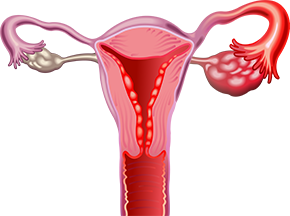

Pelvic Inflammatory Disease (PID) is a complex and multifaceted condition that affects the female reproductive system. It involves inflammation and infection in the pelvic organs, including the uterus, fallopian tubes, ovaries, and surrounding tissues. It occurs when bacteria from the vagina or cervix spread upward into the upper genital tract, leading to inflammation and potential damage to the reproductive organs. PID is a common health issue, especially among sexually active women of reproductive age. It is estimated that millions of women worldwide are affected by PID each year.
PID is often a polymicrobial infection, meaning it involves multiple types of bacteria. While sexually transmitted bacteria like gonorrhea and chlamydia are common culprits, other bacteria normally present in the vagina can also contribute to the development of PID. The infection usually begins in the cervix and can then ascend to the uterus and fallopian tubes. PID can have significant consequences for reproductive health. The inflammation and scarring caused by the infection can lead to the blockage or narrowing of the fallopian tubes, impairing the ability of the egg to be fertilized and increasing the risk of infertility. PID increases the risk of ectopic pregnancy, a potentially life-threatening condition where the fertilized egg implants outside the uterus.. In addition to infertility and ectopic pregnancy, PID can cause chronic pelvic pain, pelvic adhesions (scar tissue that binds organs together), abscess formation (pus-filled pockets), and an increased risk of pelvic organ infections.
Once a person has had PID, they are at an increased risk of experiencing recurrent episodes, especially if the underlying risk factors are not addressed or if reinfection occurs.PID not only affects the reproductive system but can also have broader implications for overall health. Studies have linked PID to an increased risk of certain conditions, including chronic pelvic pain, inflammatory bowel disease, and an increased susceptibility to HIV infection. Prevention of PID is key in reducing its incidence. This includes practicing safe sex, using barrier methods like condoms, undergoing regular STI screenings, and seeking early treatment for any suspected STIs. Vaccination against certain STIs, such as the human papillomavirus (HPV) vaccine, can also help reduce the risk of PID. In cases of PID caused by STIs, it is crucial to notify and test sexual partners to prevent reinfection and the spread of the infection. It is important to seek medical attention if PID is suspected, as early diagnosis and appropriate treatment are essential to minimize the potential long-term consequences of the condition.
One of the challenging aspects of PID is that it may present with mild or nonspecific symptoms, making it difficult to diagnose. Symptoms of PID can vary in severity and presentation, and some individuals may experience mild or no symptoms at all. However, when symptoms do occur, they can be distressing and may include:
The presence of these symptoms does not definitively confirm PID, as they can also be associated with other conditions. Only a healthcare professional can accurately diagnose PID through a thorough examination, medical history assessment, and appropriate testing. Prompt medical attention is crucial if you suspect you may have PID, as early diagnosis and treatment can help prevent complications and minimize the long-term impact on reproductive health.
Pelvic Inflammatory Disease (PID) is primarily caused by a bacterial infection, most commonly resulting from sexually transmitted infections (STIs) such as gonorrhea and chlamydia. However, other bacteria found in the vagina and cervix can also contribute to the development of PID. Here are some key factors that can increase the risk of developing PID:
PID can also occur in the absence of a known STI, as other bacteria present in the vaginal and cervical flora can contribute to the infection. Proper and timely treatment of STIs, safe sexual practices, and regular gynecological check-ups are essential for reducing the risk of PID.
PID is a serious condition that requires prompt medical attention to prevent complications and promote reproductive health. If you suspect you may have PID or are experiencing symptoms such as pelvic pain, abnormal vaginal discharge, or fever, it is crucial to seek medical care without delay. Early diagnosis and treatment can help prevent long-term complications, such as infertility and chronic pelvic pain. Remember, practicing safe sex, getting regular check-ups, and addressing any concerns promptly are key steps in maintaining your reproductive health. For more information and guidance on PID, consult with a healthcare professional or reach out to MASSH for comprehensive support and resources. Take control of your reproductive health and prioritize your well-being.
Embark on a journey of exceptional healthcare guided by industry's true luminaries who consistently exceed
expectations and set new benchmarks for excellence in everything from cutting-edge innovations to personalized care.
MASSH Group of Hospitals is a trusted name in delivering advanced healthcare solutions with a network of premier super speciality hospitals, committed to providing ethical, compassionate, and innovative care. Our expanding network ensures that cutting-edge medical services are always within your reach.